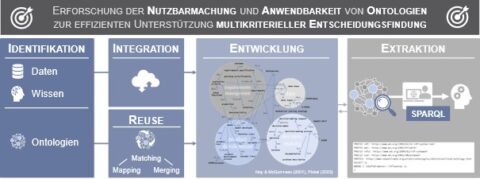Successful finalization of the DFG project “PrOntoDecide”
The complexity of multi-criteria decision-making in product development arises from numerous interactions between requirements, product and process data, as well as relevant standards. Heterogeneous data complicate the consistent evaluation of alternatives and their integration into seamless, computer-supported processes. Ontologies provide a knowledge management solution by formally structuring information, representing relations between system features, and generating new knowledge through inference processes.
Within the DFG-funded project 400342876 “PrOntoDecide – Product Development Ontology for the Provision of Decision-Relevant Knowledge in Multi-Criteria Evaluation of Decision Alternatives” in the Digital Engineering department, the study investigated how a context-specific product development ontology (PEO) can support decision-making processes. Building on previous work in multi-criteria requirements evaluation, the second project phase aimed to assess the applicability and benefits of ontologies for decision support.
The PEO was constructed based on the analysis of relevant data sources, the reuse of existing ontologies, and a systematic classification of product development-relevant knowledge. Methods for harmonizing heterogeneous information and well-defined interfaces enabled coherent integration. Additionally, natural language processing (NLP) and machine learning reduced the effort required for data preparation and linking. Validation via SPARQL queries and reasoning processes confirmed the semantic integrity of the ontology.
Its applicability was demonstrated using the E-Cross-Skate, a micro-mobility solution developed at the chair. An industrial study indicated that ontologies are rarely implemented in practice, yet their potential for improving comparability and reusing prior decisions is clearly evident. Overall, the project results show that the PEO is technically robust, reliable, and provides significant added value for decision support. It thus constitutes a solid foundation for consistent and practical application in multi-criteria decision-making processes.
